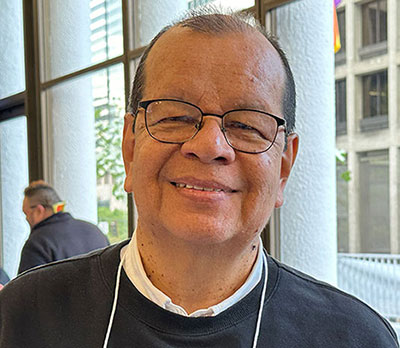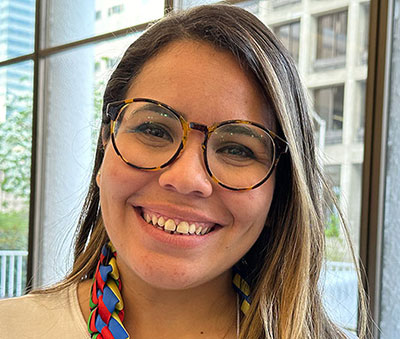| Search PNC News for stories of people and churches in our UCC Conference: |
|---|
Global partners raise justice issues in Colombia
Pablo Moreno with CEDECOL and Xiamara Cintrón-Garcia Global Ministries, mission co-worker, gave presentations for the spring PNC-UCC Annual Meeting, the Disciples of Christ Northern Lights Assembly and several churches on the global partnership of the conference and region with Justapaz and the Peace Commission of CEDECOL.
They told people what has been happening there since the 2016 Peace Accords between the government and the FARC, one of several armed groups that have controlled regions of Colombia.
 |
Pablo Moreno spoke of his work with CEDEPOL |
The conflict there for decades stems from one percent of the people owning 99 percent of the land, said Pablo. The Peace Commission accompanies churches in the countryside with pastoral visits, legal assistance for victims and training for survival efforts.
After violence from 1949 to 1959, there was a rise of guerrillas from 1960 to 1990. Paramilitarism grew from 1980 to 2004, Pablo said, followed by a humanitarian crisis that led to the peace process with the Armed Revolutionary Force of Colombia (FARC), which laid down arms after passage of the Peace Accords in a 2016 vote.
Pablo showed a map with different colors marking control of rural areas of indigenous or Afro-Colombians by different revolutionary groups. The people, who live off the land, are at the mercy of the armed groups, killings, recruitment, kidnappings, forced relocations, sexual/physical violence and river pollution from illegal mining and over-spraying coca crops making land unfarmable.
The armed groups, he explained are Marxist/Socialist Groups seeking to end the wealth inequality. Paramilitary groups contract with legal and illegal mining companies from Canada, China and the United States. Drug gangs, and the government uses paramilitary groups to cover up their participation in illegal drug extraction.
Pablo said that the Peace Commission includes Unabaptists, Justapaz, Prison Fellowship, World Vision, Peace and Hope and the Corporation for Community Social Development.
He told of CEDECOL’s work to educate on peace, share the history and memory of the conflict, explore biblical perspectives on reconciliation, study the Bible and gender, develop a pedagogy for peace, defend human rights by pastoral visits to churches to accompany communities, work with the Women’s Network for Peace to promote networking and prevent violence, document human rights violations and advocate for victims.
Pablo said the UCC and DOC support these ministries through churches affected.
“CEDECOL promotes church participation and improves communication among churches,” he said.
The Peace School facilitates people sharing their stories. It accompanies more than 100 churches affected by conflict, displacement, threats and violation of international humanitarian law, training 150 people a year in peacebuilding, strengthening ties with churches and forming a women’s network in five regions.
 |
Xiamara Cintrón-Garcia is Global Ministries mission co-worker. |
Xiomara is in Colombia with her husband, Alex Maldonado-Lizardi. Both are from Puerto Rico and serve Global Ministries—which works with 250 faith groups in 90 nations—as commissioned missioners with the DOC and UCC.
“Global Ministries accompanies partners, sending and receiving missioners and financial support to form lasting friendships,” Xiomara said. “The Latin American mission is not limited to ministries, but partnes to defend life, including a focus on justice and peace.”
She said Justapaz, founded in 1990 with Anabaptist ties, activates citizens’ efforts to promote just peace.
“It has had 30 years of experience locally, nationally and internationally training people for a lifestyle of just and sustainable peace,” she said. “It supports churches in advocacy and decision making.”
She summarized its work.
1) Peacebuilding and reconciliation include accompanying local dialogue between opposing parties and promoting reconciliation in faith communities as a foundation for a reconciled society.
2) Through training in faith communities and church organizations, it promotes nonviolence and conscientious objection to prevent recruitment of young people by legal and illegal armed groups. It emphasizes the right to conscientious objection to military service as a tool for peacebuilding.
3) For historical memory, human rights and policy advocacy—Alex’s focus—Justapaz accompanies evangelical Christian communities, victims of armed conflict, individuals and organizations to retain their historic memory to defend human rights and access to truth, promote justice and reparations, and prevent repeating the cycle of violence. This effort includes registering human rights cases, hearing victims’ stories and mediating to bring healing and reconciliation.
4) In Communication for Peace, Justapaz works for a communication system to reach the regions. The radio system reaches allies of peacebuilding, with multiple journalism genres, networks, technologies and techniques.
5) Women, Peace and Environmental justice seeks to bring dramatic changes for the world and Colombia. It empowers actions and leadership of women to rebuild Colombia’s social fabric. Women are victims of all types of social and political violence. The lack of justice on climate change issues is partly behind the armed conflict. It’s not just about macho men, but most fighting is to control land. The effort emphasizes how social and political violence against women affect their participation in just peace.
“Colombia is a patriarchal society. Victims of patriarchy are not just women, but the whole system—churches, communities and society. Churches both help and hurt people,” Xiomara said. “The goal is to build participation in decision-making.
“Women are left with the results of the armed conflicts when men are taken to war, killed or disappeared. Women are heads of families and communities,” she said. “Even though they say men are head of the house, if a man is not there, women are, and we do workshops to hear their stories and deliver tools to empower them.”
Xiomara has heard stories since 2021 about conflict in churches where few women are ministers. Saturdays, women sit in a circle to tell stories, telling of militia taking men at Sunday services. They met weekly to make a memorial quilt, bringing squares to honor a family member taken. Through quilting they began to heal, she said.
One woman whose son was taken said, “God loves you. I forgive you.”
To reach women’s groups in western Colombia, Xiomara took a plane one hour from the capital, a bus two hours and a motorcycle three hours to a village through mushy, rocky roads.
“Women were so happy we came, knowing how hard it was to get there and valuing that their voices were validated, hoping the government would listen,” she said. “We give them legal tools to go to the government and show they will help the community economically and socially.”
In 2021 and 2022, Xiomara and two colleagues from Justapaz visited villages to give workshops on types of gender-based violence and on legal actions to address the violence. While there they saw vegetable garden and chicken egg laying initiatives women started.
Even with mandatory education for women, when girls walked to schools they would be raped, killed or disappeared, so parents did not let girls go. They asked the government to build a road and provide a school bus so there could be equity in education, she said.
Xiomara said the UCC and DOC help support these ministries and help displaced people with humanitarian aid.
For information, email xcg419@gmail.com or visit globalministries.org/resource/pray-with-colombia-august-18-2024.
